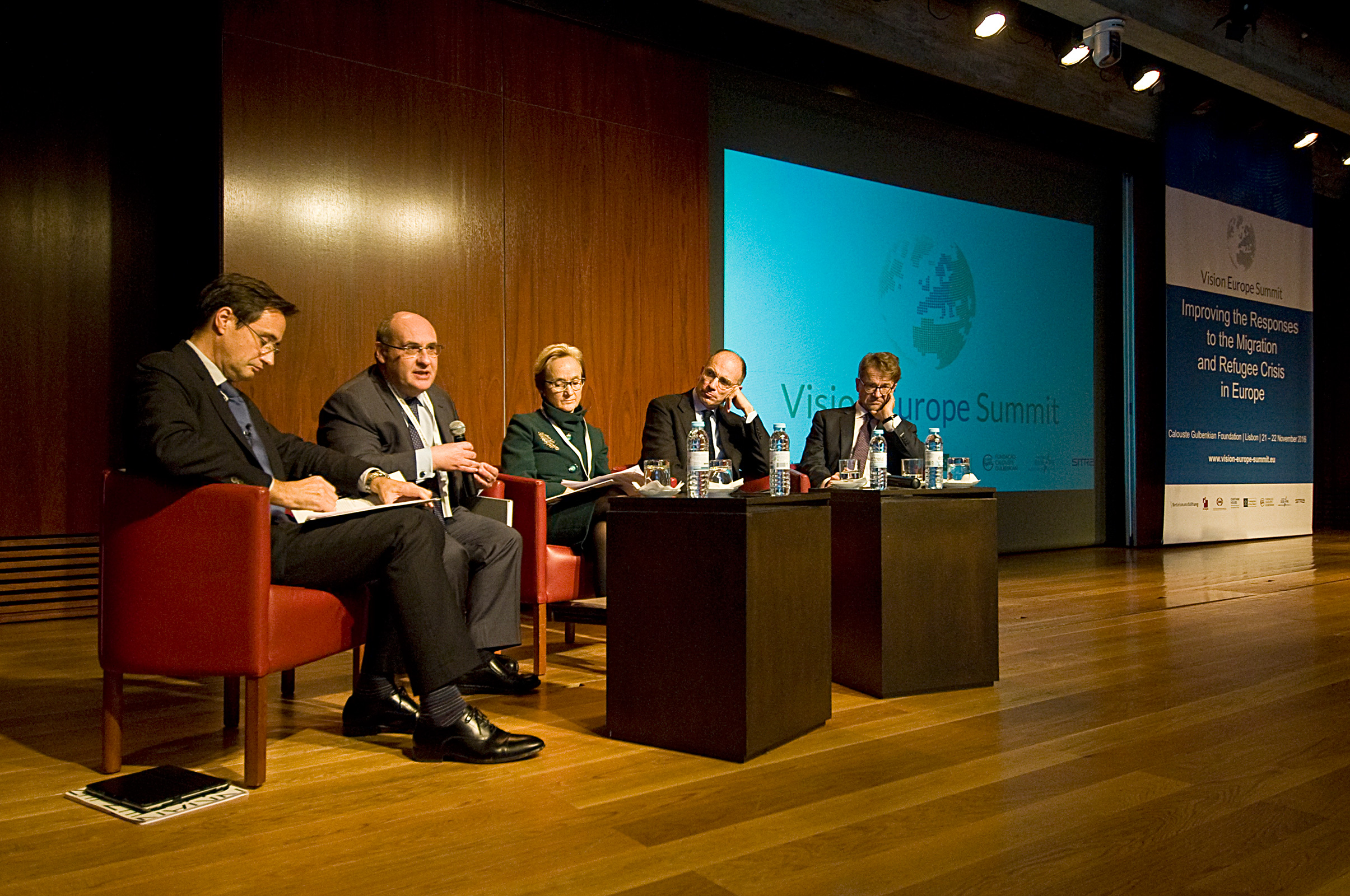A joint vision on refugees in Europe

On 21 and 22 November, the Calouste Gulbenkian Foundation hosted the second ever Vision Europe Summit – a conference that represents the culmination of a year of joint and ongoing work by four European foundations and think tanks: Bertelsmann Stiftung, Germany; Bruegel, Belgium; Calouste Gulbenkian Foundation, Portugal; CASE – Centre for Social and Economic Research, Poland; Chatham House, United Kingdom; Compagnia di San Paolo, Italy; Jacques Delors Institute, France; and The Finnish Innovation Fund, Sitra, Finland.
Throughout two days, the debate was thrown open to the theme chosen for 2016 – The refugee crisis in Europe. Of the many participants this year, the Vision Europe Summit counted on contributions from Jorge Sampaio, António Guterres, António Vitorino, Rui Marques, Miguel Poiais Maduro, Pedro Calado and the former prime minister, Enrico Letta, among many others. Over 100 political decision makers and specialist delegates from different member states, European institutions and civil society organisations gathered to discuss the four studies specifically undertaken for this event and that sought to put forward a diagnosis of the situation and its respective problems in conjunction with recommendations for policies capable of resolving them (available at www.vision-europe-summit.eu).
At the end of the two days of this conference, the consortium of eight foundations and think tanks presented their proposals and guidelines for best practices in public policies for migrations and refugees.
As Artur Santos Silva, the Calouste Gulbenkian Foundation President, highlighted, the current global refugee crisis requires an urgent and demanding response from Europe, which simultaneously needs a solid approach that enables the defining and implementing of effective, pro-active and fair policies for managing refugee flows. This however in no way represents a mission exclusively falling to European or state institutions but rather all of society, including citizens themselves to the extent that everybody needs calling upon to play their own effective role in the solutions. As Santos Silva also stated, that which we, as Europeans, prove able to do in this domain shall to a great extent dictate that which is our common future.
The importance of education
The opening conference speech was given by the former Portuguese President, Jorge Sampaio, who highlighted the importance of higher education in supporting refugees in emergency situations and furthermore declaring that “should we fail in giving priority to higher education when we deal with humanitarian crises, we shall be responsible for nurturing another uneducated generation, with disadvantages in both their development and their preparation to make a contribution towards recovering their original societies”. Jorge Sampaio continued by warning that “higher education in emergencies is no luxury” before adding that, without providing the support due, we will be “contributing to the growth of despair, anger and victimisation”, to the growth of less inclusive and even less tolerant societies. The president, also a founding member of the Global Platform for Emergency Academic Assistance to Syrian Students, emphasised that “higher education guarantees protection, boosts resilience and grants hope for the future”. Finally, Sampaio defended how higher education might also play a critical role in the reconstruction of countries destroyed by war or communities afflicted by disaster. However, for higher education to effectively contribute towards these objectives, the former president deemed essential that “a strategy based on long term objectives gets implemented from the very first day of humanitarian aid” through to the implementation of a Rapid Response Mechanism for Higher Education as a feasible point of departure for humanitarian interventions.
António Guterres on the second day of the Vision Europe Summit
The second day of the Vision Europe Summit began with a speech by António Guterres. The future Secretary General of the United Nations stressed the positive side to the arrival of migrants in a Europe that also has to deal with the challenges posed by ageing populations and even declaring that “without migrants, European societies will not be sustainable”. The former UN High Commissioner for Refugees defended that “multi-ethnic, multi-religious and multi-cultural” societies are inevitable and the challenge arises from demonstrating that such a situation does not represent any “threat” but rather an “opportunity”.
To this end, the former prime minister pointed out how “matters could not be left to run their own course”, adding that “we are not going to be effective unless we are able to provide some concrete responses to the anxiety, the fear and the emotion – and that is no easy task.” He furthermore affirmed that no country alone would be able to resolve the challenges posed by migrations and thus regional groups such as Europe should “collectively assume their responsibilities”. António Guterres also left a clear warning: “If we do not invest in diversity and in tolerance, we shall again be surprised by unexpected electoral results as our very values and global security will be called into question.”
https://youtu.be/HT2A8HyPORw
Building a common base for all
To close the Vision Europe Summit 2016 a proposed final declaration was submitted for discussion and is to be signed by the eight consortium partners and disseminated to the different responsible politicians and civil society organisations both nationally and internationally. The different institutions defend a new approach to migrations across various levels: global, European, national and local. The consortium believes that these crises may prove constructive should they drive the conditions for the reforms necessary. They furthermore defend how the European Union should take urgent, effective, proactive and fair measures.
Entitled ‘Building Common Ground: Towards strategic migration and refugee policies in Europe,’ the declaration focuses upon four strategic directions alongside four axes of recommendations, also available on the Vision Europe website.
Vision Europe Summit 2016 Declaration (PDF)
The Vision Europe Summit returns in 2017, hosted by Compagnia di San Paolo, in Turin, and taking as its general theme ‘Globalisation and its impact on inequality.
